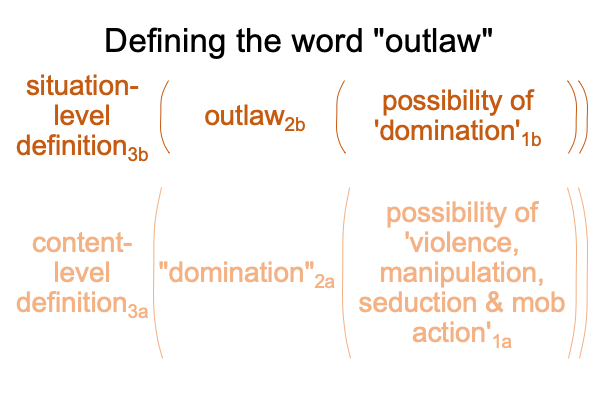0214 Can there be sovereignty without the state?
0215 Graeber and Wengrow turn their attention back to North America.
A French Jesuit, Father Maturin Le Petit, gives an account of the Natchez in the early 1800s. He draws parallels to the reign of King Louis XIV, the self-fashioned “Sun King”. The story that the missionary tells is both strange and familiar.
Like the Sun King, the Natchez ruler has total authority. Unlike the Sun King, the Natchez ruler cannot delegate his power. If any Natchez “citizen” does not live close to the Great Village, then there is no reason to obey the one who embodies the total authority of the state.
0216 What does this imply?
Sovereign power3b is a normal context3, not an actuality2 or or a potential1. The Natchez ruler2b is sovereign3b, but only for those within the Great Village at any moment in time1b. The sovereign3b stands above all other institutions3a, because sovereign power3b arises from the potential of one type of righteousness1a: order1b. On one hand, order1b is not the same as violence, knowledge or charisma. On the other hand, it1b may be.
0217 Graeber and Wengrow go over examples of apparent anomalies, where the normal context of sovereign power3b is operational, yet the actuality2b does not meet the definition of a state2, emerging from the potentials of exclusive control over force1, knowledge1 and charisma1. Besides the Natchez, the authors mention the Suillah, along the White Nile, as well as the Chavin and Olmec, already mentioned.
0218 Then, the authors turn their attention to one apparently reliable indicator of state formation: mass killings at royal burials. Such mass killings are familiar to students of ancient Mesopotamia, Egypt and China.
For example, mass killing marks the beginning of Egypt’s first dynasty, starting in 3100 B.C.
Yet, sovereignty is clearly evident during the predynastic periods, starting around 4000 B.C. Modern archaeologists speculate about the material conditions behind the transition. However, these matter-oriented speculations distract from the main point of Graeber and Wengrow’s insights in layers A:A’ and B:B’. What goes on in people’s minds matters.
0219 What is going on in people’s minds at these mass killings?
Well, let me speculate. The king is dead and I serve the king so, let me get in line to serve the king on his journey to the source.
Or, let’s get rid of these throwbacks to a bygone era.
0220 Clearly, the state2b, as the actuality of sovereign power3b, differentiates from all other organizational objectives2aand institutions3a. Yet, the state2b remains like an organizational objective2a in regards to three principles1 that may be endowed with righteousness1a (control of violence1, adminstration1 and charismatic status1).
0221 Of course, these principles associate to domination2a, but so does the word, “outlaw”. The state2b is like an outlaw2b that works for the good of its institutions. In contrast, the outlaw2b, is defined solely by self-interest.
Here is a picture of the definition of the term “outlaw”2b, as opposed to the “state”2b.

Just something to think about.
